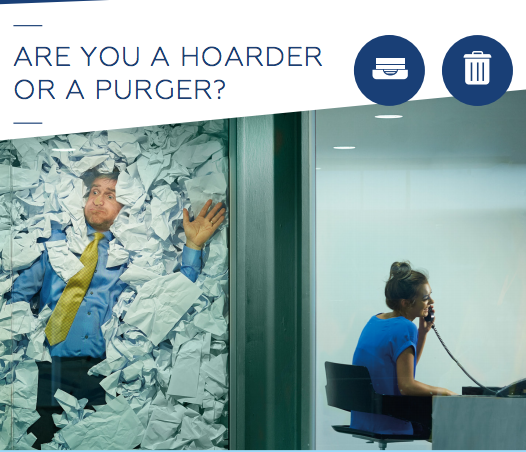The word ‘paper free’, a phrase that has been around for thirty years automatically conjures up images of businesses with decluttered and modern offices, or people who live simplistic and entirely modern lives.
Lives where in-trays are restricted, files are digitally stored and where phone bills, receipts or any other day-to-day paperwork isn’t bringing a hectic atmosphere to offices and desk drawers.
World Paper Free Day (4 November, 2016) is tomorrow, so why not spend some time to reflect on our relationship with paper and how we manage our documents.
For many people, the idea of going paper free is aspirational, however working without paper still sends shivers up the spines of many.
Our attachment to paper makes it tricky for some of us to even consider the idea of going paper free.
Paper is a useful tool; it provides us with a physical record of a document, event or piece of information. We can read it, mark it up, proof it and share it with others. We can file it with other similar documents and, according to some reports, the tactile experience of reading on paper can help us to navigate long texts in an intuitive and effective way – something that is difficult to replicate on a screen.
>See also: Paper free progress: World Paper Free Day
So people have a tendency to print out electronic documents too.
Back in 2003 Abigail Sellen and Richard Harper, authors of The Myth of the Paperless Office, discovered that when an organisation used email, it experienced a 40% increase in paper consumption.
For many, this may be no surprise – occasionally we print our documents to better digest them before we get rid of them. Sometimes we keep them neatly filed as a ‘safety net’ for use in the future.
Although there are clear benefits of digesting information in paper form, we can have too much of a good thing.
In many circumstances our need for paper can lead to document mismanagement, with people hoarding paper documents ‘just in case’ they need to look at them again. If we’re honest, there are plenty of old bank statements, out of date warranties and receipts at home that we don’t actually need.
Apply this ‘hoarding’ mentality to the corporate environment however, and the results can be shocking.
Strict regulations are in place about how businesses should store information and how long files such as contracts, HR records and account details should be retained. But many of us have been culprits of carrying a candidate’s CV around for too long, or keeping customer records in more than one place for our own convenience.
>See also: Businesses need to deal with paper’s invisible footprint
However, with data privacy rules constantly evolving, if businesses aren’t cautious, the hoarding habits of staff could find them on the wrong side of the law.
In contrast to paper hoarders are paper purgers – those who are able to happily live a paper-free life. These people use online tools, such as Evernote, to write their ‘to do’ lists, they balance family and work with an online calendar, and that calendar syncs across their multiple devices and apps.
Everything they could possibly need, they can access via a screen anyway.
However, just because they live paper-free lives, don’t be fooled into thinking that paper purgers are document management experts.
They, just like anyone else, may be spotted storing personal documents on their desktop instead of in the correct and secure central location, or losing sight of how many times they’ve shared a CV with colleagues.
There are environmental benefits and measurable energy saving advantages to paperless working, but storing and managing documents paper free isn’t without its obstacles.
The same data protection rules apply, so even if it’s digital, storing information on your laptop instead of in the central depository, or keeping personal records on email instead of in a protected archive can still get your company in trouble if you’re breaching regulations.
>See also: Technology delivers results at another NHS hospital
If businesses are to remain compliant, it’s vital that processes are put in place to keep information under control.
For those that want to strike a balance between hoarding and purging, Iron Mountain is advocating ‘paper light’ as a viable alternative.
The paper does not have to disappear – many documents will have to be kept on paper until they are no longer needed or until retention rules oblige secure destruction.
It might be appealing to digitise all the paper documents as a fast track to paper free.
But digitising everything is simply too costly for most organisations with a legacy of paper.
Taking a ‘paper light’ approach, organisations can consider digitising documents as they are required. This will not only be cost effective, it will diminish the risk of error.
Whatever route you choose, it is important to ensure that all information is handled with care and meets the appropriate legal requirements.
This World Paper Free Day, why not take a close look at the documents you hold and ask yourself how you could manage your digitised and paper-based information better, no matter if you’re a hoarder or a purger.
Sourced by Phil Greenwood, country managing director and commercial director at Iron Mountain










